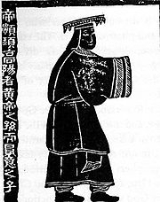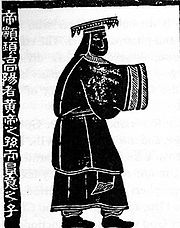
Zhuanxu
Encyclopedia
- Gaoyang is also a city located in the Chinese province of HebeiHebei' is a province of the People's Republic of China in the North China region. Its one-character abbreviation is "" , named after Ji Province, a Han Dynasty province that included what is now southern Hebei...
.

China
Chinese civilization may refer to:* China for more general discussion of the country.* Chinese culture* Greater China, the transnational community of ethnic Chinese.* History of China* Sinosphere, the area historically affected by Chinese culture...
.
A grandson of the Yellow Emperor
Yellow Emperor
The Yellow Emperor or Huangdi1 is a legendary Chinese sovereign and culture hero, included among the Three Sovereigns and Five Emperors. Tradition holds that he reigned from 2697–2597 or 2696–2598 BC...
, Zhuanxu led the Shi clan in an eastward migration to present-day Shandong
Shandong
' is a Province located on the eastern coast of the People's Republic of China. Shandong has played a major role in Chinese history from the beginning of Chinese civilization along the lower reaches of the Yellow River and served as a pivotal cultural and religious site for Taoism, Chinese...
, where intermarriages with the Dongyi
Dongyi
Dongyi was a collective term for people in eastern China and in lands located to the east of ancient China. People referred to as Dongyi vary across the ages.The early Dongyi culture was one of earliest neolithic cultures in China....
clan enlarged and augmented their tribal influences. At age twenty, he became their sovereign, going on to rule for seventy-eight years until his death.
He made contributions to a unified calendar
Calendar
A calendar is a system of organizing days for social, religious, commercial, or administrative purposes. This is done by giving names to periods of time, typically days, weeks, months, and years. The name given to each day is known as a date. Periods in a calendar are usually, though not...
, astrology
Astrology
Astrology consists of a number of belief systems which hold that there is a relationship between astronomical phenomena and events in the human world...
, religion
Religion
Religion is a collection of cultural systems, belief systems, and worldviews that establishes symbols that relate humanity to spirituality and, sometimes, to moral values. Many religions have narratives, symbols, traditions and sacred histories that are intended to give meaning to life or to...
reforms to oppose shamanism
Shamanism
Shamanism is an anthropological term referencing a range of beliefs and practices regarding communication with the spiritual world. To quote Eliade: "A first definition of this complex phenomenon, and perhaps the least hazardous, will be: shamanism = technique of ecstasy." Shamanism encompasses the...
, upheld the patriarchal (as opposed to the previous matriarchal) system, and forbade close-kin marriage. Zhuanxu is held by many to be one of the Five Emperors.
Zhuanxu was succeeded by his cousin's son, Ku
Emperor Ku
Kù , or Dì Kù , also known as Gāoxīn Shì , was a mythical Emperor of China during the Three Sovereigns and Five Emperors period. He was the son of Jiăo Jí , the grandson of Shăohào and the great grandson of Huáng-dì , the Yellow Emperor. According to speculative dates he is supposed to have ruled...
. In the Shiji, he criticized one of his sons for being a dullard. Since only two sons were named, it might have been Gun
Gun (Chinese)
Gun was the father of Yu the Great, the founder of the Xia Dynasty. He was appointed by Yao to control the flooding rivers. He used dikes to stop the rivers from flooding, but they eventually collapsed after nine years and killed many people.- In mythology :...
, father of Yu the Great
Yu the Great
Yu the Great , was a legendary ruler of Ancient China famed for his introduction of flood control, inaugurating dynastic rule in China by founding the Xia Dynasty, and for his upright moral character....
or Qiongchan, the ancestor of Shun. Yao
Yao (ruler)
Yao , was a legendary Chinese ruler, one of the Three Sovereigns and the Five Emperors. His ancestral name (姓)is Yi Qi (伊祁) or Qi(祁),clan name (氏)is Taotang , given name is Fangxun , as the second son to Emperor Ku and Qingdu...
had also criticized Gun for being incompetent and ruinous. The Shiji labelled Qiongchan an insignificant commoner though it does not mention how he fell from grace. He also had eight unnamed sons of good repute that later worked for Shun.

